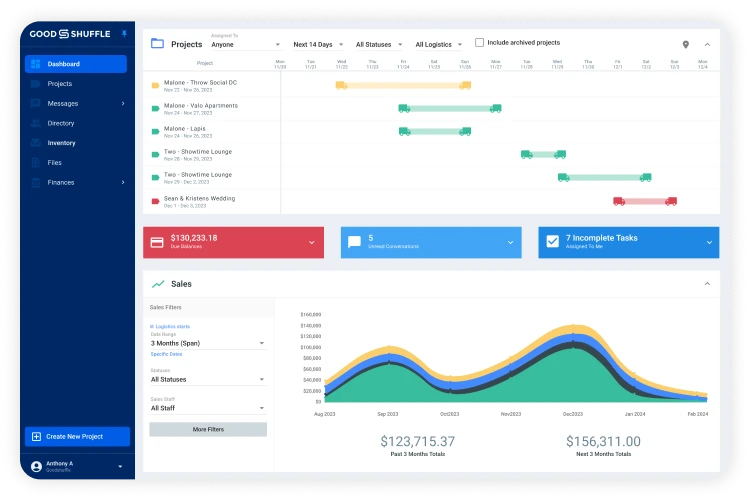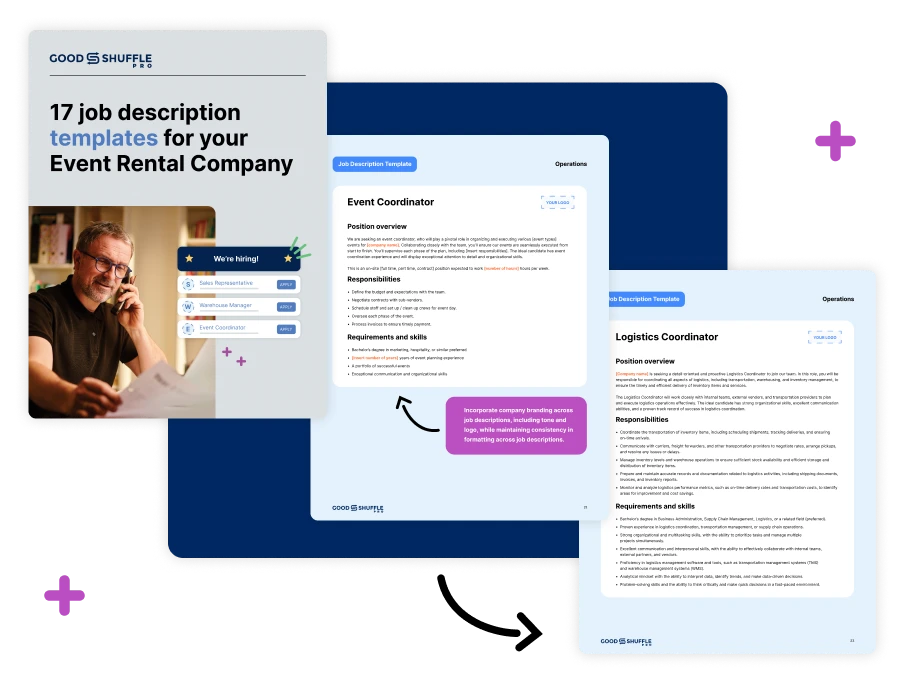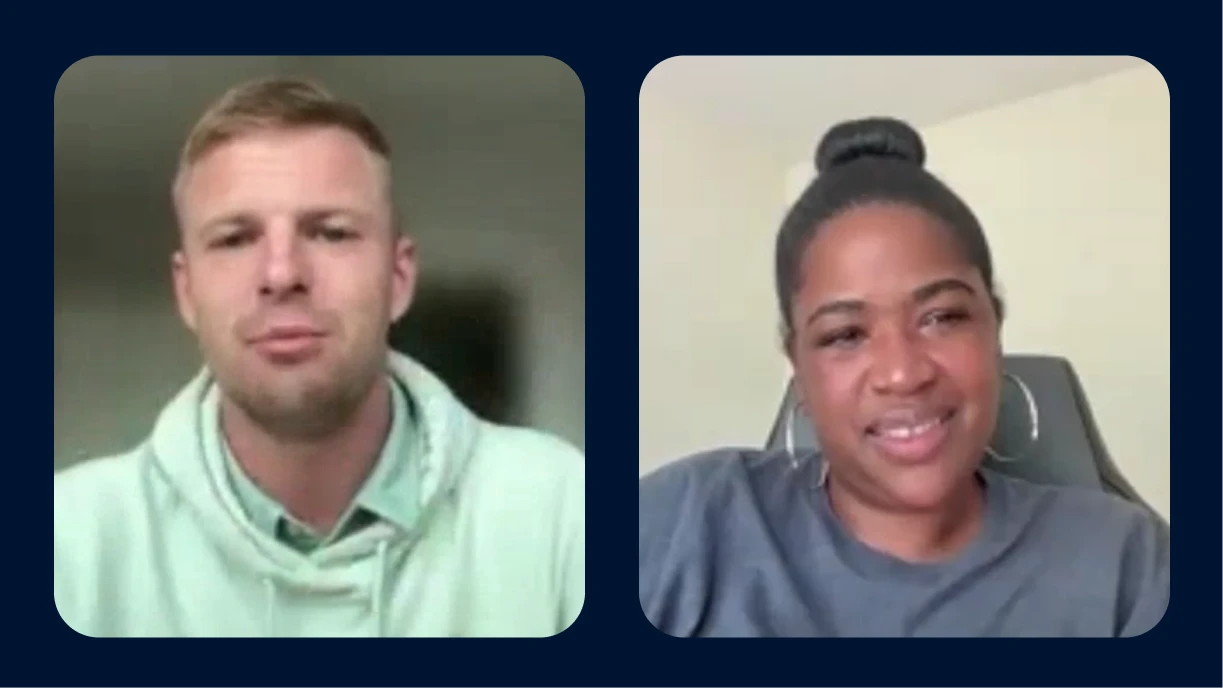A good salesperson can sell sand in the desert.
Unfortunately, they can be as hard to find as a shady spot in the Sahara.
Needless to say, sales-focused roles are the backbone of the events industry. But finding sales talent, creating good compensation structures, and keeping your top salespeople motivated is no easy feat — especially when you’ve got a booming business to run.
As part of Goodshuffle’s 2024 User Summit, we sat down with:
- Bridget Nistico
Director of Sales at Ridgewells Catering - Jeff Clarke
Chief Operating Officer at Party Pleasers Services - Fernando DaSilva
Owner at Signature Event Rentals - Howie Teger
President & Creative Director, NYX Entertainment & Events
Read on to hear their top tips for hiring event salespeople, from compensation best practices to retention strategies.
7 Hiring and Compensation Best Practices
Hiring often feels hit or miss. An interview is no true indicator of how well the candidate will perform in the role. But by following these best practices, you can increase your chances of hiring a star.
1. Assess the scope of the role
Before you even begin hiring, take a look at the role’s impact on business objectives and opportunities for growth. How much revenue would you expect to make with and without this hire? This will help you determine an appropriate compensation package.
2. Ask consistent questions that speak to the role
As you begin interviewing, nail down your question list. Bridget Nistico, Director of Sales at Ridgewells Catering, advises you to speak to your HR team (or a knowledgeable founder, if you don’t have an HR team) to help you decide which questions will determine an individual’s ability to execute effectively in the role.
3. Understand what motivates your sales team
Incentivizing your sales team with uncapped earnings potential or increasing year-over-year pay encourages them to bring more new business in — just make sure you adjust based on company margins so it’s a win-win.
There’s nothing wrong with a little healthy competition either, but be careful not to take things too far. Jeff Clarke, Chief Operating Officer at Party Pleasers Services, warns, “Especially with multiple offices and multiple sales teams, be careful you don’t create pay plans that cause divisive competition between your players.”
4. “Try before you buy” with internal candidates
Internal hires will be more familiar with your processes and offerings, making them ideal candidates. Clarke says he always considers internal candidates first, bringing them to trade shows and seeing how they sell on their feet. A promotion could also help them make the next step in their career.
“The person who can sell most effectively is the one who’s familiar with the venue, who’s familiar with the type of event, and has performed that kind of event before. They have a huge leg up on another talented salesperson that’s never been in that venue and has never seen the event before.”
Jeff Clarke
Chief Operating Officer at Party Pleasers Services
5. Always be recruiting
You’ve heard of “always be selling,” but have you heard of “always be recruiting?” Keep an eye out when you’re at the grocery store, an amusement park, or even at the office. You never know when you might find your next top salesperson. Howie Teger, President & Creative Director, NYX Entertainment & Events, told the story of how new administrative assistant overheard him on sales calls and decided to try her hand at selling. The next week she dropped five signed contracts on his desk.
6. Don’t cut corners on onboarding
Have a set pay structure during training so your new hires have time to onboard, including shadowing other salespeople, understanding your processes, and learning. Then you can switch to a commission and base pay structure. Remember that learning doesn’t end with onboarding, and offering additional training is helpful. Fernando DaSilva, Owner at Signature Event Rentals, recommends ARA trainings.
7. Cover all your bases
Every company is different, so this list probably won’t be able to cover all of your unique considerations. If you work events like mitzvahs that book years in advance, for instance, Teger recommends creating a scaled payout structure for your sales team. It’ll motivate them to book far-out events without having to wait five years to see a dime.
9 Qualities of All Great Event Sales Hires
Have you ever heard the saying, “The only constant is change?”
The ancient Greek proverb is over 2500 years old, but nothing rings truer in the events industry today. The space is fast-paced, hectic, and often requires working evenings and weekends (especially during busy season) — in short, not the job for someone looking for a traditional 9-5.
“Ensure you’re transparent about the expectations and requirements. Someone who understands the nature of the industry and has a passion for it is most likely to succeed.”
Bridget Nistico
Director of Sales at Ridgewells Catering
The best event salespeople are:
- Flexible with their schedules and responsibilities.
- Committed to the company and their role.
- Excited about the events space.
- Good at making emotional sales.
- Experienced in events (or quick to learn about the industry).
- Enthusiastic about company values.
- Good at building trust.
- Diligent about capturing details and communicating them to the team.
- Professional in their self-presentation.
Our event pros stress that event sales are very emotional and relationship-based. Clients feel safest with a salesperson that gives them peace of mind. Keep that in mind during the interview process and ask yourself, “Would I trust this person with my next big event?”
“Trust the product, trust the salesperson, trust the company.”
Fernando DaSilva
Owner at Signature Event Rentals
6 Strategies for Sales Talent Retention
Hiring is just one part of the equation. If you find and hire an amazing salesperson and they leave three months later, you’ll have sunk a lot of time and resources into a short-term investment.
That’s not to say turnover will never happen. It’s an inevitable part of any business. But you can encourage longevity in your sales team by following these five strategies.
1. Offer career support
In an industry where career growth can oftentimes be limited, it’s important to create opportunities for upward mobility. For Nistico, that means building out career progression paths that pave a way toward title changes, increased pay, and more responsibilities. It also means keeping strong one-to-one connections with your team and supporting them in their goals.
2. Share feedback with your team
Because sales teams aren’t usually directly involved in the event logistics, they might not get to experience a hug from the bride at the end of the night or a high five from the birthday boy. Clarke believes in the importance of making your sales team feel like what they do matters. He recommends sharing feedback from clients with your team, so they know firsthand they’re appreciated.
3. Hold weekly sync meetings
At Party Pleasers, Clarke also holds weekly staff meetings where his team reports their numbers and shares notes. It’s a safe space to create some healthy pressure, trade tactics on what’s working and what isn’t, and build a sense of community in service of a larger goal. DaSilva holds routine pulse meetings at Signature Event Rentals, too, where the team reports on metrics.
4. Live your company values and culture
Company values and culture are what make your company a great place to work. But all too often, they’re lip service. Decide what your values are, and live and breathe them in your work. DaSilva’s team follows a 100-0 model, for example, which means 100% responsibility and zero excuses. This helps them build trust internally and with clients.
“Everything comes down to company culture. You want a culture in your company where all employees feel appreciated, heard, and respected, and that their job means more than a paycheck.”
Howie Teger
President & Creative Director, NYX Entertainment & Events
5. Create SMART goals
You and your team will probably struggle to reach your goals if they’re not SMART — that is, Specific, Measurable, Attainable, Relevant, and Time-bound. DaSilva recommends SMART goal-setting for increased accountability. For example, if you want to increase your average deal size, a SMART goal could be: Increase the average order size to $4000 by the end of the year by adding at least one upselling or cross-selling pitch to every customer interaction.
6. Provide motivation to your team
Big on the power of positive reinforcement, DaSilva sometimes prints out five-star reviews and leaves them on team members’ desks, along with a thank you note. Team lunches and swag do the trick as well, along with internal promotions when they’re merited.
Staffing for Success
In Teger’s words, “Finding the right people, nurturing them, and compensating them is the key to success for a company.” With the tips in this article, you’re now ready to find and develop your winning salespeople. What are you waiting for?
Learn More About Goodshuffle Pro
Book a demo to see our event business software in action.








